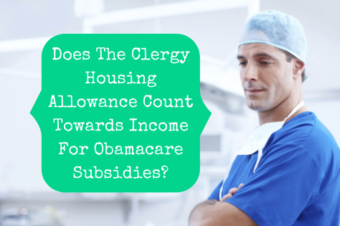Despite being a hot topic over the last couple of decades, the cost of health care is still a major problem for American families. Healthcare costs tripled between 2001 and 2016, and the average non-elderly family now pays $8,200, or 11% of their income, each year.
That is a national average where many people have employer-provided health insurance. Many churches cannot afford to pay as much of their pastors’ premiums or even offer health insurance at all. If you are without health insurance, it is open enrollment right now for the Affordable Care Act and you can sign up right now on the national exchange. You can also read about your other health insurance options here.
Even with insurance, most of us don’t have an extra $8,000+ just laying around for medical costs. It’s something we should be saving for on a regular basis so we can be prepared when something does come up. It can be hard to find the room in your budget to save for medical costs, but the government has provided something that makes saving towards health care costs a little bit easier and more cost-effective: Health Savings Accounts (HSAs).
What Is A Health Savings Account?
Back in 2003, the government established HSAs as a way for people covered under high-deductible health plans (HDHPs) to get special tax treatment for saving money for out-of-pocket medical expenses. By saving in an HSA, they received a tax benefit for planning ahead. As HDHPs gained in popularity, the government wanted to incentivize saving to cover the higher deductibles, so that medical events would not be financially devastating even with insurance in place.
What’s So Great About Health Savings Accounts?
There are two aspects of an HSA that make it especially attractive:
No Taxes On The Front End
First of all, you can contribute money to your HSA pre-tax. Because tax hasn’t been taken out, you end up with more to contribute. Many people have their HSA money withheld directly from their paycheck so that they never even see it or have to pay taxes on it. You don’t have to have it automatically withheld, though, you can just take a deduction when you file your taxes for the same result. Either way – save now or save later – you still save on taxes by contributing to an HSA.
No Taxes On The Back End
Not only do you save on taxes when you put money into an HSA, you save when you take it out as well. Distributions from an HSA are tax-free when used for qualified medical expenses.
This makes an HSA very unique among tax-advantaged government savings plans, like IRAs. Usually, you either contribute pre-tax but have to pay taxes on withdrawals, or you pay your taxes upfront before contributing and don’t get taxed on the withdrawals. Health Savings Accounts take the best of both kinds of plans to make a superiorly tax-advantaged savings vehicle.
Example Of Tax Savings
Let’s look at an example with real numbers. Ben and Dan each have $1,000 to save towards medical expenses. Ben saves in a regular savings account and Dan opens an HSA.
Before he can start saving, Ben has to pay his taxes, 20%, so he only has $800 to put into his account. His savings account earns him 0.1% a year. If he leaves it in there for 5 years, it will grow to an amazing $804.
Since Dan is using an HSA, he doesn’t pay taxes on his $1,000 and it all goes into the account. Because of this, even if he earns the same interest rate as Ben he’ll end up with $201 more than him, or $1,005 total. However, if he isn’t planning on using the money any time soon, he can likely earn a much better rate of return. Most HSAs offer a wide variety of investment options, from money market to stock mutual funds. And the best part is that you don’t have to pay any taxes on the interest you earn when used for qualified expenses.
Are You Eligible For A Health Savings Account?
These are the requirements to be eligible to open an HSA:
- You must be covered by an HDHP
- You cannot be enrolled in Medicare or other health coverage
- You cannot be claimed as a dependent on someone else’s tax return
HSAs cannot be joint accounts, they are individual accounts. If you are married, only one of you owns the account while the other can be an authorized user. When the account owner dies, the spouse gets to take over the account. The surviving spouse gets to use it as his or her own without paying any taxes (for qualified expenses) or penalties.
What Are The Contribution Rules?
As long as you are covered by an HDHP, anyone may make contributions to your HSA. This includes you, the account owner, your employer, any family member, or another third party, like a church or church member.
The 2020 contribution limits are $3,550 for singles and $7,100 for families, with a $1,000 catch-up contribution available to those over 55. Contributions for 2020 can be made all the way up to the tax filing deadline for the year, April 15, 2021. The limit will go up $50 for singles and $100 for families in 2021.
Once you are no longer covered by an HDHP, you can’t make anymore contributions. You can still use the funds in the account for eligible expenses, though.
What Can You Spend The Money On?
HSA money can be used for many things that aren’t usually covered by health insurance plans. A few examples are deductibles, co-insurance, prescriptions, dental care and vision care. Most things that would typically qualify for the medical expense deduction on your tax return qualify for an HSA.
For people over 65, qualified expenses include:
- Premiums for Medicare parts A, B, D and Medicare HMA
- The portion an employee pays for employer-sponsored health insurance
- The employee portion of employer-sponsored retiree health insurance
Supplemental policies like Medigap are not IRS qualified expenses.
It’s Not A Use-It-Or-Lose-It Account
It’s easy to confuse HSAs with FSAs (Flexible Savings Accounts) and all of the other acronyms the government uses. If you’re familiar with an FSA, you know that any unused funds in excess of $500 are forfeited at the end of the year.
Luckily, HSAs are different. Account balances simply roll over from year to year, allowing for incredible growth and accumulation of savings. As long as you are eligible, you can continue to contribute to your account tax-free and let the money grow tax-free for use at any time in the future, whether near or distant.
How Do I Open A Health Savings Account?
Now that you’ve seen how great they are, how do you get one? It’s as easy as opening a bank account, once you’ve chosen who you want to open it with. Just fill out the application and start depositing.
You can start HSAs with banks, brokers, credit unions and insurance companies. If you just Google “Open HSA,” you’ll see plenty of good options. Here is a good article with tips for choosing an HSA custodian, and this blog post lists some of the most popular ones along with their fees and investment options.
Good luck and happy savings!














